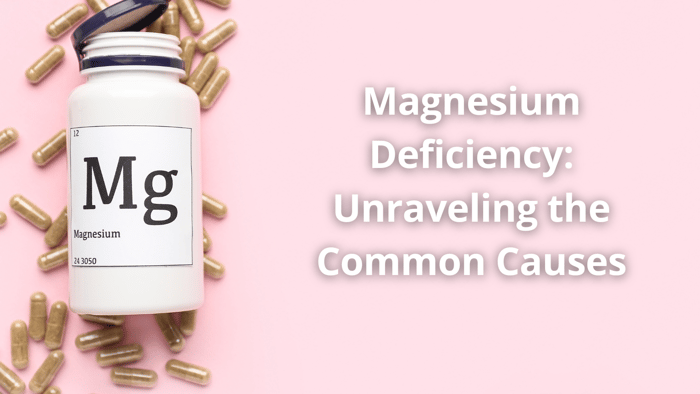In this guide, we will help you learn the difference between different forms of magnesium. Discover the differences between magnesium citrate and other forms. Find the perfect one for your needs!
As we age, our bodies require essential nutrients to maintain optimal health and well-being. Magnesium is an important mineral that helps with nerve and muscle function, energy production, and bone health. Unfortunately, many individuals aged 50 and above are deficient in magnesium, making supplementation necessary.
Factors to Consider When Choosing Magnesium
When selecting the right magnesium supplement, several key factors should be taken into account to ensure you make the best choice for your health needs.
Firstly, consider the type of magnesium, as each form offers different benefits and levels of bioavailability. For instance, magnesium citrate is known for its laxative properties, while magnesium glycinate is preferred for its calming effects on the brain and muscles.
The dosage is another crucial aspect; it's important to align the amount of magnesium with your specific health goals and dietary needs.
Additionally, the quality of the supplement is paramount. Opt for products from reputable brands that adhere to high manufacturing standards and undergo third-party testing.
Be aware of potential interactions with other medications you may be taking and understand the possible side effects of each magnesium type.
Lastly, consider your individual health conditions and requirements, such as any existing health issues or dietary restrictions, to choose a magnesium supplement that aligns with your personal health journey.
Understanding Different Types Of Magnesium Forms
It's important to understand the available magnesium forms. Magnesium supplements come in various forms, such as magnesium citrate, magnesium oxide, and magnesium chloride. Each form has unique characteristics and bioavailability, affecting how well the body absorbs and utilizes the mineral. It's also important to note, your body absorbs certain magnesium supplements more easily. Some types may help support specific health issues.
Magnesium Citrate - C
ommonly used for relieving constipation and improving digestion.
|
This form of magnesium is commonly used for its ability to support regular bowel movements and relieve constipation. Due to its good bioavailability, it is readily absorbed by the body. Magnesium citrate is often recommended as a laxative, as it helps promote healthy digestion and bowel regularity. It can be particularly beneficial for individuals who struggle with occasional constipation or need temporary relief from digestive issues.
Magnesium Oxide - The Most Poorly Absorbed Magnesium
|
Magnesium oxide contains a higher percentage of elemental magnesium, making it a popular choice for addressing magnesium deficiency, but it has the poorest absorption rate of all magnesium types. Magnesium oxide is poorly absorbed primarily because of its lower bioavailability and reduced solubility compared to other forms of magnesium.
When consumed, magnesium oxide encounters challenges in breaking down and dissolving in the digestive system, resulting in limited absorption into the bloodstream. As a salt-bound form, it requires higher stomach acid levels for optimal absorption, which can be problematic for individuals with lower acidity levels or those taking medications that suppress stomach acid production.
Additionally, magnesium oxide's propensity to attract water molecules contributes to its laxative effect, further hindering its absorption and utilization by the body. Due to these factors, alternative forms of magnesium, such as protein-bound forms like glycinate or chelate, are generally recommended as they exhibit better absorption rates and lower risk of gastrointestinal side effects.
Magnesium Chloride - Most Common Form in Capsules & Topicals - Easily Absorbed
|
Magnesium chloride is highly bioavailable and easily absorbed by the body. It is commonly used in topical applications, such as magnesium oil or bath salts, for transdermal absorption. When applied to the skin, magnesium chloride can provide localized relief for muscle cramps, tension, and soreness. It can also be taken orally to support overall magnesium levels and promote various health benefits, including muscle function and bone health.
Magnesium Glycinate - Often used on its own to improve sleep and help with inflammation
|
Magnesium Glycinate is a chelated form of magnesium, meaning it is bound to the amino acid glycine. This unique combination enhances its absorption and bioavailability, making it highly effective in supplementing magnesium levels. Magnesium Glycinate is known for being gentle on the digestive system, making it an excellent choice for individuals prone to digestive discomfort or having sensitive stomachs. It is widely used to support various health concerns, including muscle function, stress management, sleep quality, and overall well-being.
Magnesium Malate - Often used as a food additive for acidity & less laxative effect
Magnesium malate contains naturally occurring malic acid, commonly found in foods like fruit and wine, which contributes to its sour taste. This acid is often utilized as a food additive to enhance flavor and acidity. Studies indicate that magnesium malate is highly bioavailable, facilitating effective absorption in the digestive tract, making it an excellent choice for replenishing magnesium levels. Many individuals find it to be gentler on the system and less likely to cause a laxative effect compared to other magnesium types, which can be advantageous based on individual needs. While magnesium malate has been occasionally recommended for managing symptoms of fibromyalgia and chronic fatigue syndrome, further high-quality research is necessary to establish its full benefits (16Trusted Source).
It's important to note that the best use of each form of magnesium may vary depending on individual needs and preferences. Consulting with a healthcare professional or a registered dietitian can help determine the most suitable form and dosage of magnesium for your specific requirements.
Magnesium L-threonate - May be helpful for brain disorders such as age-related memory loss
|
Magnesium L-threonate is a notable compound in the magnesium supplement category. It is created by combining magnesium with threonic acid, a water-soluble substance derived from the metabolic breakdown of vitamin C. A significant benefit of Magnesium L-threonate is its high level of absorbability, which makes it an effective option for supplementation. Animal studies have shown that this form of magnesium might be particularly effective in boosting magnesium levels in brain cells. This suggests that Magnesium L-threonate could be beneficial for brain health, particularly in managing age-related memory issues and other cognitive disorders. Its unique properties make Magnesium L-threonate a compelling choice for those seeking to enhance cognitive health through magnesium supplementation.
Magnesium Orotate - Primarily used for enhancing heart health and cellular function.
Magnesium orotate is a form of magnesium supplement where magnesium is bound to orotic acid, a naturally occurring substance in the body. This combination is often chosen for its potential to enhance cellular function due to orotic acid's role in the construction of genetic material, including DNA. Magnesium orotate is primarily used for its cardiovascular benefits. It is believed to support heart health by improving energy production in heart cells and potentially reducing symptoms of heart failure and angina. The most common use of magnesium orotate is in the realm of heart health, particularly among those seeking to improve their cardiovascular function and endurance. Studies have explored its efficacy, with some suggesting that it may offer unique benefits in terms of heart health compared to other forms of magnesium. However, it's important to note that while there is some promising research, more extensive studies are needed to fully understand its benefits and efficacy.
Health benefits of magnesium supplements
Getting an adequate amount of magnesium in our diets is crucial for maintaining overall health and well-being. Magnesium plays a vital role in numerous physiological processes and is involved in over 300 enzymatic reactions in the body. Here are the key reasons why magnesium is important:
1. Energy Production: Magnesium is essential for converting food into energy at the cellular level. It plays a critical role in ATP (adenosine triphosphate) production, which is the energy currency of our cells.
2. Muscle Function: Magnesium is necessary for proper muscle contraction and relaxation. It helps regulate muscle tone, including the heart muscles, and supports smooth muscle function throughout the body.
3. Bone Health: Magnesium is a key nutrient for maintaining strong and healthy bones. It works synergistically with calcium and vitamin D to support bone density and the formation of new bone tissue.
4. Nervous System Support: Adequate magnesium levels are crucial for a healthy nervous system. It helps regulate neurotransmitter function, promoting proper communication between nerve cells and supporting cognitive function.
5. Heart Health: Magnesium plays a role in maintaining a regular heart rhythm and supporting cardiovascular health. It helps relax blood vessels, which can help maintain healthy blood pressure levels.
6. Blood Sugar Regulation: Magnesium is involved in glucose metabolism and insulin function, helping to regulate blood sugar levels. It supports insulin sensitivity, which is crucial for preventing insulin resistance and type 2 diabetes.
7. Stress and Sleep Management: Magnesium has a calming effect on the nervous system and can help promote relaxation. It may aid in reducing stress, anxiety, and improving sleep quality.
8. Overall Well-Being: Magnesium contributes to overall health and well-being by supporting immune function, DNA synthesis, protein synthesis, and maintaining electrolyte balance.
The recommended daily intake of magnesium is 400mg. However, studies indicate that a significant portion of the population, approximately 70%, does not meet this requirement. What's more, more than half of these individuals struggle to obtain sufficient magnesium solely from their diet. To reach the recommended amount through food alone, one would need to consume large quantities of magnesium-rich sources such as greens, nuts, and seeds on a daily basis. Unfortunately, this is not practical or feasible for most people. Therefore, considering magnesium supplementation can be a practical and effective solution to ensure adequate magnesium intake and support overall health.
The Absolute Best Magnesium Supplement We Could Make...
Given all of the information above, we at Revival Point wanted to create the absolute best Magnesium supplement possible.
So we created our own form of Magnesium Glycinate Lysinate based on extensive research and testing data.
The ingredients in it are of the highest quality... and have been shown in studies to provide all of the benefits of Magnesium Glycinate Lysinate (calming nerves... increased absorption... superior bioavailability... and a noticeable lack of G.I. issues)...
And best of all, you can start taking it right away... simply click the link below for more information:
Click Here Now to Get Our Magnesium Glycinate Lysinate Now!
Citations
1. Blancquaert L, Vervaet C, Derave W. Predicting and Testing Bioavailability of Magnesium Supplements. Nutrients. 2019 Jul 20;11(7):1663. doi: 10.3390/nu11071663. PMID: 31330811; PMCID: PMC6683096.
2. Boyle NB, et al. The effects of magnesium supplementation on subjective anxiety and stress-a systematic review. Nutrients. 2017 Apr 26;9(5):429. doi: 10.3390/nu9050429.
3. Abbasi B, et al. The effect of magnesium supplementation on primary insomnia in the elderly: A double-blind placebo-controlled clinical trial. J Res Med Sci. 2012 Dec;17(12):1161-9.





